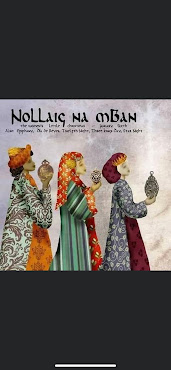Or: Stop Making Bridget into Inspiration Barbie!!!!
source: thebookofsassafras.blogspot.com/p/sovereignty-and-goddess-of-our.html
Candlemas is here, with the celebration of St. Bridget's day. We are at a cross quarter, half way between winter solstice and spring equinox. Where I live, and in most of northern Europe, it's still deep winter, but in warmer areas it is lambing time. In New England, it's soon sugaring time. The first spring industries for food production and winter survival are returning. In southern Appalachia, it's time to start those broccoli seeds for March planting. Here in the Alleghenies, I have a month before I will start my own cabbage. St. Bridget's day is almost here.
But. Oy. I've been seeing a massive number of online Instagram/Facebook/Tik Tok posts portraying Bridget as a young, often red-haired Barbie, with authors talkin about Bridget as bringing "inspiration," "healing," "love and light." Bridget becomes this powerless, gentle, de-fanged goddess of Live, Laugh, Love.
Yuck.
It's been three decades since Starhawk asked the pagan community to stop this crap: making all Goddesses slim, sexy depictions of young women with societally sanctioned prettiness and popular acceptability. With my own blog and puja to Bridget, I find these simplifications annoying and the power-stripping of one of the Great Goddesses of Europe incredibly sexist. Why would anyone become pagan to make Bridget into the Goddess of "love and light." Whenever anyone reduces women to a sign found in every Walmart, we should pause.
Bridget the Great Goddess. She ruled Blacksmithing. Smithcraft was the industrial powerhouse of the iron age, bringing stronger metal to European communities. Think of Bridget as the Great Goddess of what was the computer science of her age. Smithing made nails possible, people. Smithcraft made nails, hooks, andirons, hobs, a damper. Think about iron age homes without dampers, people. Without fireplace grates. Bridget the Hearth Goddess is a powerhouse because she as the Goddess of smithcraft brings us the modern hearth, able to do more and cook more and heat more thanks to smithcraft. And smithing without tools is hard work itself, and Bridget as Goddess of smithcraft brought anvils and hammers and tongs. Bridget is the superpower, multinational Goddess of Industry.
 |
| Bridget the Bishop, with her Staff. source: https://druidry.org/resources/brigid-survival-of-a-goddess |
And she ruled Poetry. But poetry in a time before literacy wasn't a pretty occupation or even a written occupation, because written history didn't yet exist. Bridget ruled poetry, the industry of stories, of history keeping, of story telling. Irish poetry historically has a strong rulebook of rhyming forms, necessary for bards and family historians and teachers to use for making a remembered oral tradition. Bridget ruled poetry which means she represents history, teaching, and story telling in an age when sharing knowledge required a poetry of remembrance. She is a powerhouse of words and passing traditions. Bridget is the Google of Goddesses.
And Bridget rules the land. Celtic society was a patriarchal society, so looking at even Celtic Goddesses requires a feminist lens. Celtic nations fought and bickered and some of the oral histories we get from them are deeply sexist and warlike. However, accepting these stories as literal history or as literal worship is as much a mistake as accepting a Bible written and repeatedly edited by men. Or accepting hollywood movies as representing US history (with Rambo being more important than Stacey Abrams or Winona LaDuke - which I'm sure many rightwing men believe). When stories of a pagan Bridget challenging war lords morph into the St. Bridget who stole land for her monastery (coed and of which she was Bishop), these stories speak of a Goddess that outranks tribal nations and kings. And good for that. Why would I follow a Goddess who doesn't challenge and uproot patriarchy?
And that brings us to the historical Bridget, who used her cloak to steal land from Kings, to help criminals escape punishment, who ran that monastery as bishop and ruler, and who became the stuff of both Goddess and Christian legend. She ruled the sun, where she hung her cloak. She is a helper to cows and ewes, the midwife to Mary birthing Jesus, the healer through magical use of ribbons representing her cloak, through rushes representing her connection to light and fire, through hearth prayers and traditions that have all sorts of Christian language but harken back to the Goddess of might who challenged kings and ruled industry. There are gazillions of blogposts out there on making Bridget dolls, an Irish tradition, of cooking fish, aWelsh tradition, of Bridget as the Cailleach and special scones (Scottish tradition), and finally there is St. Bridget's Ale. Remember Bridget is the Goddess of Industry, so what is more important an industry that brewing? So of course there is Bridget of the Ale. In some Welsh traditions, she is also associated with wine.
 |
| source:https://druidry.org/resources/brigid-survival-of-a-goddess |
So I absolutely support Candlemas and St. Bridget's Day celebrations of making scones, putting out ribbons for Bridget to bless as symbols of her cloak, and making the St. Bridget's crosses as many tutorials explain. Sure, light some candles. Feel inspired. But for St. Bridget's day this year, disgusted as I am with the Barbie Bridget being espoused around the pagan net, I am going to refinance my mortgage for land sovereignty, drink some ale for Cwrw Sant Ffraid ("Beer St. Bride" in Welsh), and I'm gonna work on my computer back ups and programming, because Bridget of Industry would rule computers today if we were to take Her seriously.
Which I do.
Most of all, feminists need Goddess to overthrow patriarchy. Whether Saint or Goddess, Bridget was out there in Iron Age and medieval times, grabbing land, making beer, creating history, running industry. Follow her and we should do no less.






















